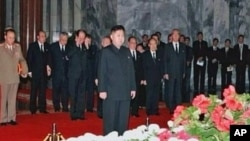The death of North Korean leader Kim Jong Il raises numerous concerns about what is really happening in the impoverished country, considered the world's most-reclusive. VOA's Northeast Asia Correspondent Steve Herman, who has lived in the region for most of the past 20 years, fields reader queries via Twitter and Facebook.
Q: Are there any indications Kim Jong Un has received training to lead North Korea? (via Twitter)
A: Yes. It is apparent Kim Jong Un had been groomed by his father over a period of perhaps several years to eventually succeed him. The first hints that Kim Jong Il had chosen his Swiss-educated son (over two of Jong Un's older brothers) emerged in early 2009.
Kim Jong Il may have felt more urgency to groom an heir-apparent after suffering a stroke in 2008. But the younger Kim's status was not clearly indicated until the latter part of last year when he was made a military general and appointed to other high military and political posts in the authoritarian country.
Outsiders who have met the younger Kim describe him as listening intently and soft spoken. Some analysts say they expect Jong Un to demonstrate he can be ruthless and purge some senior figures to solidify his own grip on power, much as his father did after he took the helm.
While many express doubt that such a young and inexperienced inheritor can effectively lead a very troubled country as North Korea, it is worth noting that the same misgivings were expressed about Kim Jong Il when he took over after the death of his father, Kim Il Sung. However, Jong Il was older - in his early 50's - when he assumed leadership, and had many more years to prepare than did Kim Jong Un.
Q: Is Kim Jong Un going to be able to lead or will the military attempt a coup? (via Twitter)
A: Initial indications from North Korea project a united front under Kim Jong Un, who was quickly deemed the "Great Successor."
Since North Korea's inception, the Kim family and the military leadership have enjoyed a symbiotic relationship. The upper echelon of the Korean People's Army receives special privileges from the political leadership under tight control of the Kims and, in exchange, the Kims have been able to count on the military's loyalty. Indeed Kim Jong Il's primary policy was "songun" (military first).
Kim Jong Un may find it prudent to extend that policy, especially considering that in September, 2010, he was made a four-star general despite no apparent military experience.
Q: Why did it take North Korea two days to release the news of Kim Jong Il's death? (via Facebook)
A: Such delays seem to be the rule rather than the exception in revealing the deaths of absolute rulers in countries where the state controls all media.
When Kim Il Sung, North Korea's founder and Kim Jong Il's father, died in 1994, the announcement came 34 hours after the time that North Korea said he had succumbed. But in the case of Kim Jong Il the government waited 52 hours based on the timeline provided by North Korean media. But there was also a reference in the death announcement to a supposed internal notification of Kim's death on December 17. Some Western intelligence analysts suggest this indicates the leadership may have been wracked with uncertainty about how to handle the stunning message.
Q: How old was Kim Jong Il? (via Twitter)
A: He was either 69 or 70. North Korea has long listed his official birth date as February 16, 1942 and says Kim was born on revered Mt. Paekdu in Japanese-occupied Korea. Soviet records, however, indicate he was born in Siberia in 1941.




















